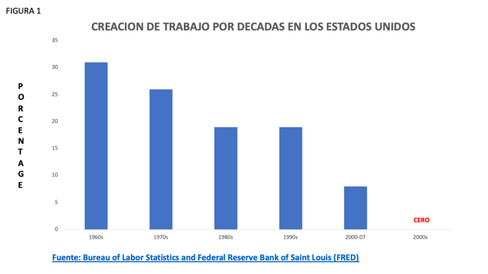
Dr. Héctor Geager
President: Global Leadership & Education Consultants, Inc.
International Speaker-Professor-
Specialized in Leadership-Management-Political Science-
History-Education-Mentor-Author-Philanthropist-Humanist

The production process by human labor is rapidly being replaced by robots and Artificial Intelligence. The acceleration is happening at such a speed that workers in the manufacturing industry have been almost entirely replaced by robots and Artificial Intelligence. One only needs to observe how jobs previously performed by humans are now being carried out by machines.
Graph #1 shows that by the year 2000, the American economy was no longer creating new jobs. Graph #2 illustrates the time it takes for job recovery after a recession. Meanwhile, Graph #3 highlights the disappearance of jobs in the manufacturing sector, one of the largest employment sectors in the economy.
In the tertiary sector of the economy, or the service industry, jobs have been vanishing at a rapid pace. For instance, around March of this year, Amazon laid off more than 750,000 warehouse workers. Banks have been replacing human tellers with ATMs and digital technology for over a decade.
In the past five years, supermarkets and stores have been implementing technologies that scan barcodes and process payments through machines. Toll booths have been automated and are now managed by video cameras, which also control traffic using cameras and traffic lights. Behind the application of these technologies lies job elimination, driven by Artificial Intelligence. And we are only at the beginning of the Artificial Intelligence Revolution!
Google and other companies have been experimenting with Artificial Intelligence technology to replace drivers. Driverless vehicles will leave millions of people without jobs, such as taxi drivers, truck drivers, and others. Since 2008, IBM has been introducing Watson—a machine capable of diagnosing and recommending treatments for illnesses with greater accuracy than a doctor. Additionally, Artificial Intelligence has been applied to legal systems, and we are already seeing the emergence of applications for legal use. As a result, the legal profession will be transformed in the coming years. Commercial airplanes and ships are being operated largely by AI. It would not be surprising if, in the coming years, we fly in planes and sail on ships piloted entirely by Artificial Intelligence.

Even computer programming is being affected. AI algorithms are much faster, more efficient, and make fewer errors than a human programmer. All of this is happening without even considering the military-industrial sector, which is the main creator of Artificial Intelligence.
Wars are already being conducted with the application of Artificial Intelligence. Ballistic missiles, drones, aircraft, naval ships, and all modern weapons rely on AI to play an essential role. We could assert, without fear of being wrong, that any repetitive job or one based on logic will be altered or disappear within the next 10 years, falling victim to Artificial Intelligence.
It is as a result of robotics and AI that a growing mass of unemployed individuals has been created, and this trend continues to rise.
Another troubling trend is the fact that the distribution of productivity driven by the Robot-AI revolution is causing extreme economic inequality. For example, 40 percent of productivity in the United States is going to just 1 percent of the population—and the trend is increasing (the statistics cited are from before the pandemic; it can currently be expected to have worsened).

Graph #4 illustrates this phenomenon, which begins to emerge around 1999, coinciding with massive unemployment. In other words, as massive unemployment rises, so does the productivity generated by machines and the concentration of wealth among the top 1 percent of the population.
Many economists argue that "... this is because corporations, and behind them the wealthy, own the robots and Artificial Intelligence, or the means of production." The reality is that automation continues to impoverish the middle class while making the wealthy even richer.
What is your opinion?
Is your job at risk of being replaced by the Robotic-AI Revolution?









Comentarios